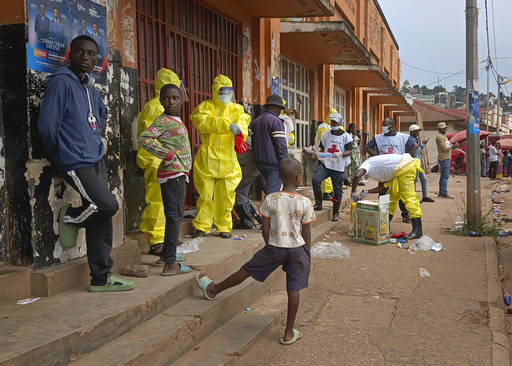
KAMPALA, Uganda — On Tuesday, it was reported that Ugandan military forces have entered the eastern Congolese city of Bunia to support local armed forces in quelling escalating violence attributed to various armed groups. This move follows a meeting held on Monday between Ugandan and Congolese military leaders in Bunia, the administrative center of Ituri province, where a joint military initiative was agreed upon, as stated by Maj. Gen. Felix Kulayigye, spokesperson for the Ugandan military.
According to Kulayigye, Ugandan troops now exert control over Bunia in cooperation with Congolese forces, citing the need to respond to crimes, particularly ethnically motivated killings carried out by armed factions. While specific incidents were not disclosed, the city of Bunia has long been a battleground for violent clashes between the Lendu farmers and the Hema pastoralist community. Last week, Ugandan military leader Gen. Muhoozi Kainerugaba indicated plans to take control of Bunia amid allegations of violent attacks on the Hema community. Bunia is situated roughly 40 kilometers (25 miles) from the border with Uganda.
Since 2021, Ugandan forces have operated in eastern Congo under a cooperative agreement with the Congolese government. They are primarily focused on tracking elements of the Allied Democratic Forces (ADF), a rebel group known for its connections to the Islamic State. Reports have emerged of skirmishes between Ugandan forces and the ADF in remote mountainous regions of Ituri and neighboring North Kivu, where the armed M23 rebellion has resurfaced since 2021, supported by Rwanda.
The increased military presence of Uganda in eastern Congo raises concerns about the potential escalation of conflict within a region already riddled with lawlessness. Analysts note that other hostile groups may seek to engage in the deteriorating situation. According to the Economist Intelligence Unit, the reemergence of the M23 rebellion has created a security vacuum on the Congolese side of the border with Uganda, which is motivated to protect itself against extremist groups that could exploit the ongoing unrest. The organization suggests that while Uganda does not likely intend to engage directly in the M23 conflict, it is focused on defensive measures to safeguard its borders.
However, regional analysts express apprehension about the situation resembling the conflicts from the 1990s, when Congo’s former leader Laurent-Desire Kabila invited foreign militaries, including those from Angola and Zimbabwe, to combat rebels supported by Uganda and Rwanda. Angelo Izama, an expert with the Uganda-based think tank Fanaka Kwawote, remarked that this situation could mark the beginning of a regional escalation. “This is the first shot in the regional escalation that had been anticipated,” he commented, adding that the patterns observed suggest a resurgence of Uganda-Rwanda interests in the Congolese landscape.
In the wake of these developments, M23 rebels have made notable territorial gains, currently controlling Goma, North Kivu’s capital, and recently capturing Bukavu, the capital of South Kivu province, after rapid advances over the weekend. Congolese military resistance appears to have been minimal. Local authorities categorize the M23 rebels as a proxy army for Rwanda, with evidence indicating that approximately 4,000 Rwandan troops support the group, as confirmed by United Nations experts.
Since the onset of conflict in 1996, Uganda and Rwanda have each pursued their interests in eastern Congo, frequently vying for pro-rebel influence. They have also faced allegations of illegally exploiting Congo’s rich mineral resources, including gold and coltan. In light of the M23 pressures, Congolese President Felix Tshisekedi has sought assistance from regional allies to maintain the sovereignty of his nation, which is comparable in size to western Europe. In this context, troops from Burundi, which has a history of fraught relations with Rwanda, have been deployed to assist Congolese military efforts, alongside forces from Tanzania and South Africa under the framework of a regional cooperative initiative.

